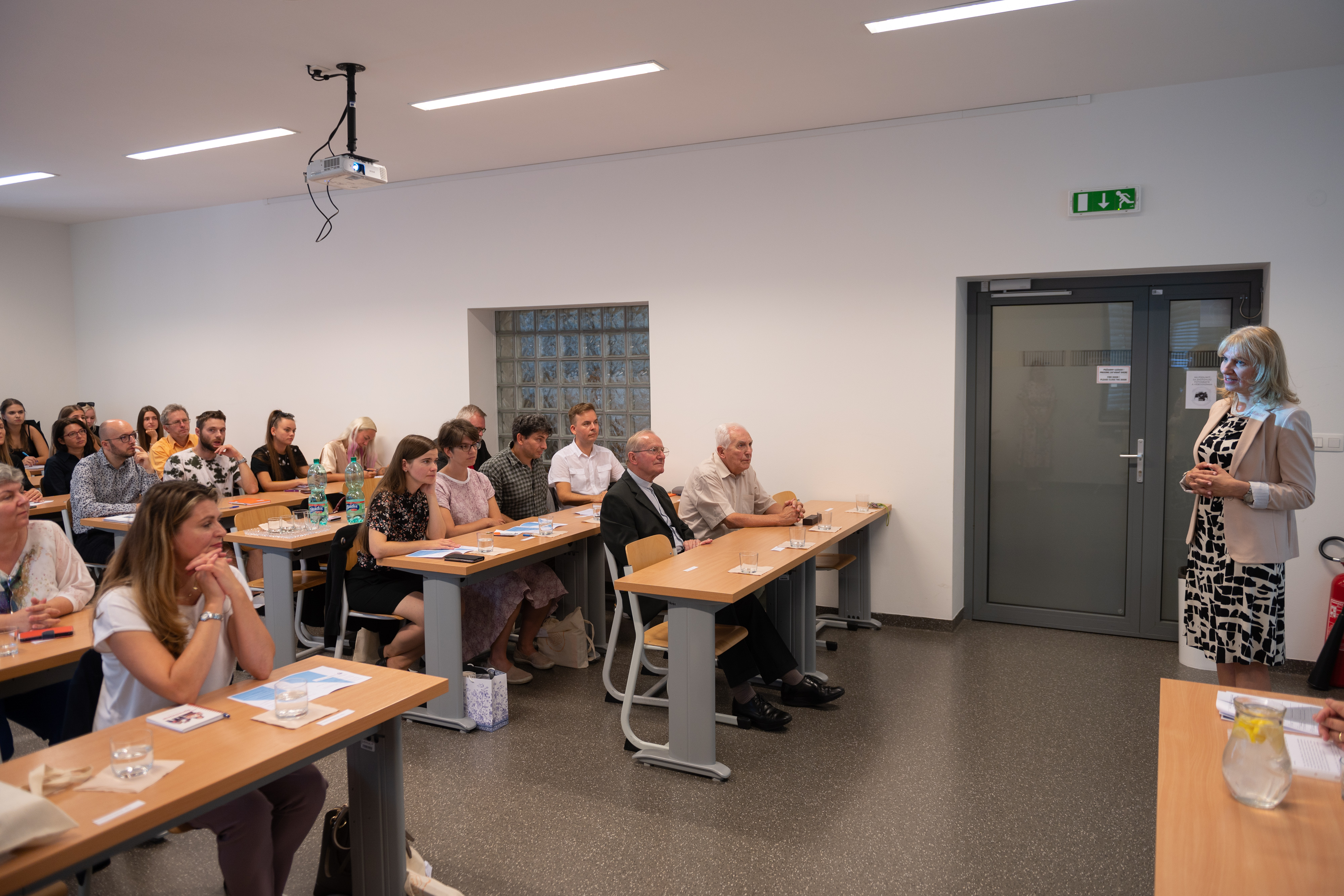All events
Scientific Seminar on Czech and Slovak Spiritual Literature
On September 28, 2023, an international scientific seminar was held at Faculty of Central European Studies, Constantine the Philosopher University in Nitra. This year’s topic was Spiritual-Religious Motifs in Slovak and Czech Literatureand Audiovisual Media.
The event was organized with the support of Institute of Central European Languages and Cultures, Faculty of Central European Studies in Nitra and the Embassy of the Czech Republic in Bratislava. Mons. František Rábek, president of the Council of the Catholic Bishops Conference in Slovakia for Education, Science and culture, also participated in the event, as the seminar was also held as accompanying event within the Year of Christian Culture.
The seminar started with the presentation of the programme and participants. To the opening contributed with his words the director of the institute doc. PhDr. Ján Gallik, PhD., and the Director of the Czech Centre Bratislava Mgr. Monika Koblerová. Together with her, the event was attended by the secretary of the Embassy of Czech Republic Mgr. Miloslava Fukalová. All guests were also welcomed by the Dean of the Faculty, Dr. habil. PaedDr. Žofia Bárcziová, PhD.
After the introductions, the programme could begin. The first lecturer was Mgr. Kateřina Voleková, Ph.D., from the Institute for the Czech Language of the Czech Academy of Sciences. Her topic was Old Czech lexeme "domoskyna" in the poetry of Vladimír Holan. In the presentation we could see sequences from the poem Prvý testament (1940), where the notable Czech poet called "the alchemist of words" used the unconventional and not entirely clear in meaning term "domoskyna". It is a unique word - translation of the Latin "domicilium" in Psalm 102:7 ("I have become like a bird alone on a roof"), which occurs only in the Old Czech Psalter of the Chapter from the 1480s. This unique lexeme was later mentioned in Czech dictionaries in the 19th century (e.g. Kott's Czech-German Dictionary) and Holan reached for this dictionary when enriching his vocabulary. This is how the unique obscure medieval lexeme found its way into modern Czech poetry. At the end of the presentation, several possibilities were put forward as to what the word "domoskyna" from the Czech medieval translator could mean.
This study was followed by a presentation by Mgr. et Mgr. Katarína Džunková, Ph.D., from the Faculty of Arts, Charles University, entitled Questions of Style in the New Testament of the 4th Redaction of the Old Czech Bible Translation (1450 – 1489). At the beginning, the history of the Old Czech Bible translation was presented using a timeline, which is divided into four different redactions, while the first complete Czech Bible translation (the Dresden Bible) dates back to 1360. The lecture was dedicated to the 4th redaction and the individualities of the translation style of the Utraquist bishop, diplomat and theologian Martin Lupáč. It turns out that he was an inventive translator who wanted to bring the Bible closer to the readers in the middle of the 15th century (he used phraseology, expressions, informal germanisms) and some of his translation solutions have endured for many centuries.
The next lecture was entitled Spiritual Development of the Personality of Jan Čep till 1948. From Neothomistic Inspirations to Christian Personalism by Mgr. Petr Komenda, Ph.D., from Palacký University in Olomouc. It was about the philosophy of internal exile, migration and existentiality of the Czech Catholic author Jan Čep. The difficult life of the author, how his works are reflected more significantly only after his death, whether his life in France was also the subject of the final discussion.
After a short lunch break, the second part of the seminar continued. We could listen to the lecture of Mgr. Jozef Tomášik about the poetry collection Jáchymovští andělé. The lecture consisted of three parts. J. Tomášik presented the Slovak candidate for beatification, Janko Havlík. He had a difficult life, he was in a difficult situation as a student when he was tortured in prison for his faith during communism, he became seriously ill as a result. Although he could not complete his studies in theology, in the Jáchymov camps and prisons he served many prisoners with a similar fate as a priest. That is why Jozef Tomášik wrote lines about him, which were published in 2014 entitled Anjel v cele and in Czech translation in 2022 entitled Jáchymovští andělé.
At the seminar, there was also a lecture by doc. PhDr. Ján Gallik, PhD., entitled Over the poetry of Pavel Strauss, in which he compared the poetry of this important Slovak poet and essayist with the work of the Polish priest and poet Jan Twardovský. Final lecture Known and unknown Ján Frátrik: Slovak poet from the Central European aspect belonged to Mgr. Michal Krauter, in which he described the writer Ján Frátrik, who were considered by literary criticism to be a companion of the authors of Slovak Catholic modernism. The program of the seminar ended with a rich discussion.










Text: Bc. Noémi Lelkes (student of the programme Central European Area Studies)
Photo: Mgr. art. Ing. Peter Korček (Czech Center Bratislava)


